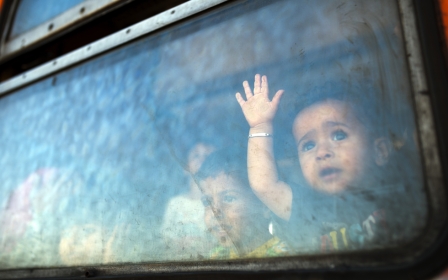Refugee crisis tests Europe's core ideals, says Merkel

German Chancellor Angela Merkel called on Monday for EU action on the migrant crisis, saying it was testing the core ideals of universal rights at the heart of the European Union.
"If Europe fails on the question of refugees, if this close link with universal civil rights is broken, then it won't be the Europe we wished for," she said, urging other EU nations to accept their fair share of asylum seekers.
Speaking to foreign journalists in Berlin, Merkel said: "Europe as a whole needs to move. Member states must share responsibility for asylum-seeking refugees."
Germany, the union's most populous country and biggest economy, expects to receive 800,000 asylum seekers this year, four times the total for 2014 and more than any other EU country.
"If we don't arrive at a fair distribution then the issue of Schengen will arise - we do not want that," she said, referring to the passport-free zone covering much of the EU and several neighbouring countries.
She poured cold water on an idea proposed earlier Monday by Austria's Interior Minister Johanna Mikl-Leitner - to cut EU funding for members that don't take in their fair share, with Merkel quipping that "I don't want to bring out the torture instruments".
The chancellor said Italy especially must be offered help from other EU nations as it had taken in huge numbers of migrants arriving via the Mediterranean Sea.
She implicitly criticised countries including Slovakia that have said they would reject migrants from majority Islamic countries, saying: "if we start saying 'I do not want Muslims' ... that cannot be good".
'We can do this'
Merkel expressed confidence that Germany would rise to the challenge of taking in record numbers of people seeking safe haven, as it has faced other problems such as natural disasters, the 1990 national reunification and its ongoing nuclear phase-out.
"We can do this," she stressed, saying Germany was economically and politically strong enough to overcome the challenge.
By 24 September, Merkel said, her government would announce a package of measures to speed up the processing of asylum applications and building of shelters for refugees, many of whom are now staying in container homes and tent cities.
Merkel said Germany must cut red tape to quickly build more accommodation and train more language teachers, saying that while German "thoroughness is super... what we need now is German flexibility".
On a spate of hate crimes and attacks against refugee shelters in Germany, she vowed that the "full force of law" would be brought down on those who insult, attack or launch arson attacks targeting the newcomers.
"There will be zero tolerance for those who put in question the dignity of other people," she said.
Merkel urged citizens to stay away from far-right and xenophobic rallies, and not to follow those who have "prejudice, coldness, even hate in their hearts".
She thanked the many volunteers who have helped welcome refugees who "by far outnumber the hate-mongers and xenophobes".
Today in much of the world "Germany is seen as a country of hope and opportunity", something that had "not always been the case", Merkel said.
German police, meanwhile, said they had stepped up arrests of traffickers smuggling migrants into the country, with the number set to near last year's total by the end of August.
Between January and July this year, police made 1,785 such arrests, while the figure for August was expected to reach 300 to 400, federal police told AFP.
In all of 2014, German police arrested 2,149 people suspected of illegally bringing migrants and asylum-seekers into the country.
Of the people smugglers arrested this year, 227 came from Hungary, followed by Romania (147), Serbia (110), Syria (108) and Bulgaria (101).
Stay informed with MEE's newsletters
Sign up to get the latest alerts, insights and analysis, starting with Turkey Unpacked
Middle East Eye delivers independent and unrivalled coverage and analysis of the Middle East, North Africa and beyond. To learn more about republishing this content and the associated fees, please fill out this form. More about MEE can be found here.




